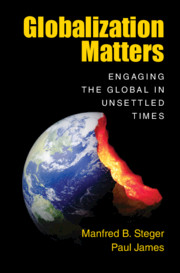Book contents
- Globalization Matters
- Globalization Matters
- Copyright page
- Contents
- Figures
- Acknowledgements
- 1 Introduction
- 2 Mapping a New Genealogy of ‘Globalization’
- 3 Rethinking the Dominant Framework of Globalization Theory
- 4 Considering the Subjective Dimensions of Globalization
- 5 Outlining an Engaged Theory of Globalization
- 6 Excavating the Long History of Globalization
- 7 Examining the Promise of Global Studies
- 8 Making Sense of the Populist Challenge to Globalization
- 9 Confronting the Global Urban Imaginary
- 10 Living in the Unsettled World of the Anthropocene
- 11 Concluding Reflections
- Appendices
- Bibliography
- Index
2 - Mapping a New Genealogy of ‘Globalization’
Published online by Cambridge University Press: 01 August 2019
- Globalization Matters
- Globalization Matters
- Copyright page
- Contents
- Figures
- Acknowledgements
- 1 Introduction
- 2 Mapping a New Genealogy of ‘Globalization’
- 3 Rethinking the Dominant Framework of Globalization Theory
- 4 Considering the Subjective Dimensions of Globalization
- 5 Outlining an Engaged Theory of Globalization
- 6 Excavating the Long History of Globalization
- 7 Examining the Promise of Global Studies
- 8 Making Sense of the Populist Challenge to Globalization
- 9 Confronting the Global Urban Imaginary
- 10 Living in the Unsettled World of the Anthropocene
- 11 Concluding Reflections
- Appendices
- Bibliography
- Index
Summary
This chapter tracks the social life of the concept of ‘globalization’. The concept burst upon the world relatively recently; it was rarely used before the 1990s. This chapter follows the genealogy of the concept from its unlikely beginnings in the decades of the 1930s–1950s to the heated debates across the end of the twentieth century to the present. Before it became a buzzword, the concept began to be used in the most unlikely fields: in education to describe the global life of the mind; in international relations to describe the extension of the European Common Market; and in journalism to describe how the ‘American Negro and his problem are taking on a global significance’. The chapter begins to answer a basic question that has not before been researched in detail: through what lineages and processes did the concept of globalization become so important? Drawing on textual research and interviews with key originating figures in the field of global studies, the chapter attempts to get past the usual anecdotes about the formation and etymology of the concept that centre on alleged inventors of the term or references to the first use of the term ‘globalization’ in dictionaries.
- Type
- Chapter
- Information
- Globalization MattersEngaging the Global in Unsettled Times, pp. 20 - 49Publisher: Cambridge University PressPrint publication year: 2019

